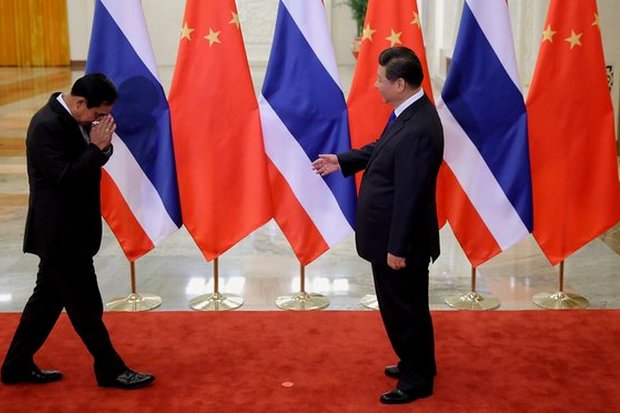
Thailand should reap the benefits of its relations with China to turn both the country and Asean into a peaceful power in the regional political and security arena, experts suggested at a seminar.
Tej Bunnag, former foreign minister, said Thailand, last week elected chairman of the G-77 group under the United Nations for 2016-2017, regards China as a key ally in the developing-countries bloc and did not see that country's rise as a threat to the principle of peaceful co-existence agreed between China, Thailand and Asean.
He was speaking Monday at a seminar entitled "40 Years of Thai-China Relations: Past, Present and Future" jointly organised by the Foreign Ministry, Chinese embassy, Chulalongkorn University's Institute of Security and International Studies, and Saranrom Institute of Foreign Affairs Foundation.
Mr Tej highlighted several Thai and Chinese figures as well as a thaw in US-China ties that helped dispel the mistrust that existed until diplomatic relations between Thailand and China were established on July 1, 1975.
Xu Dunxin, a member of the Chinese Foreign Ministry's Foreign Policy Advisory Group, said the "One Belt-One Road" initiative introduced by Chinese President Xi Jinping in 2013 was developed and based on historical heritage to forge new opportunities for China as well as regional partners and also to overcome current challenges.
"Many countries including Russia have now realised the benefits of the Chinese initiative. We urge all partners to come up with their own plans or together with us to link the maritime and land silk routes.
"China will not stop opening up, don't worry. Our door will continue to open wider," said Mr Xu, also a former deputy foreign minister and former ambassador to Japan.
Mr Xu said that despite slow global economic growth, China is still a global economic driver and remains committed to supporting Asean's mature growth on the world stage.
The Asean Infrastructure Investment Bank, he said, would play a "linking" role between continents.
On the bilateral front, Sino-Thai relations go back hundreds of years and in recent decades the two sides have endured several difficulties together such as the Sars epidemic, he said.
Bilateral trade and investment remains strong, with the trade value between the two countries reaching US$70 billion (2.5 trillion baht) in 2014 while Chinese tourists were Thailand's largest group of visitors, said Mr Xu.
He also expressed hope that the two sides would lay the groundwork for the railway links within this year.
Likhit Dhiravegin, former deputy interior minister, said that with China's role as a world leader, regional leader and Asean partner, Thailand finds itself in a difficult position.
The kingdom is unsure about how to react in the South China Sea dispute while China's dam projects along the Mekong River have also affected downstream nations.
"It's best that we take heed of reality. Avoiding discussion of the issues would do more harm than good," said Mr Likhit.
Jullapong Nonsrichai, former ambassador to Beijing, urged China and Thailand to quickly resolve their differences on the railway projects.
"Such a joint investment project could not easily materialise during normal political times for Thailand. It's also important for China to instil confidence for other Asean projects to follow," said Mr Jullapong, former deputy foreign minister under the ousted Pheu Thai government.
